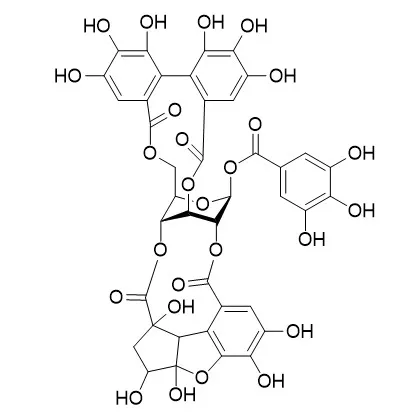| In vitro: |
| Complementary Medicine Research, 2009. | | Phyllanthus urinaria Increases Apoptosis and Reduces Telomerase Activity in Human Nasopharyngeal Carcinoma Cells.[Reference: WebLink] | This study was designed to obtain the chemical fingerprint and to investigate the effect of Phyllanthus urinaria on telomerase activity and apoptotic pathways in the human nasopharyngeal carcinoma cell line (NPC-BM1).
METHODS AND RESULTS:
The polyphenol compounds in P. urinaria were investigated by HPLC/MS. Cell viability with the treatment of P. urinaria, gallic acid, ellagic acid, quercetin and cisplatin was detected by MTT assay. TUNEL assay, DNA fragmentation analysis and caspase3 activity were used to confirm apoptotic changes. Telomerase activity was determined using the TRAP assay. RNA isolation and RT-PCR were used to analyze the related genes expression. All experiments on treatments with P. urinaria from 0–3 mg/ml were carried out for 24 h. 5 major compounds including gallic acid, brevifolin carboxylic acid, corilagin, Phyllanthusiin C and ellagic acid were identified as a plant fingerprint by HPLC/MS. With the MTT assay, we demonstrated that P. urinaria, gallic acid and ellagic acid reduce cell viability. The apoptosis features showed DNA fragmentation and increased caspase-3 activity associated with the down-regulation of Bcl-2, but not of Bax, p53, and PCNA (proliferating cell nuclear antigen) in P. urinaria-treated NPC-BM1 cells. Furthermore, treatment of NPC-BM1 cells led to an inhibition of hTERT (human telomerase reverse transcriptase), hTP1 (human telomerase-associated protein 1) and c-myc mRNA expression and to decreased telomerase activity.
CONCLUSIONS:
This study suggests that P. urinaria induces the death of NPC-BM1 cells in vitro through the induction of apoptosis and inhibited telomerase activity. |
|






 Cell. 2018 Jan 11;172(1-2):249-261.e12. doi: 10.1016/j.cell.2017.12.019.IF=36.216(2019)
Cell. 2018 Jan 11;172(1-2):249-261.e12. doi: 10.1016/j.cell.2017.12.019.IF=36.216(2019) Cell Metab. 2020 Mar 3;31(3):534-548.e5. doi: 10.1016/j.cmet.2020.01.002.IF=22.415(2019)
Cell Metab. 2020 Mar 3;31(3):534-548.e5. doi: 10.1016/j.cmet.2020.01.002.IF=22.415(2019) Mol Cell. 2017 Nov 16;68(4):673-685.e6. doi: 10.1016/j.molcel.2017.10.022.IF=14.548(2019)
Mol Cell. 2017 Nov 16;68(4):673-685.e6. doi: 10.1016/j.molcel.2017.10.022.IF=14.548(2019)